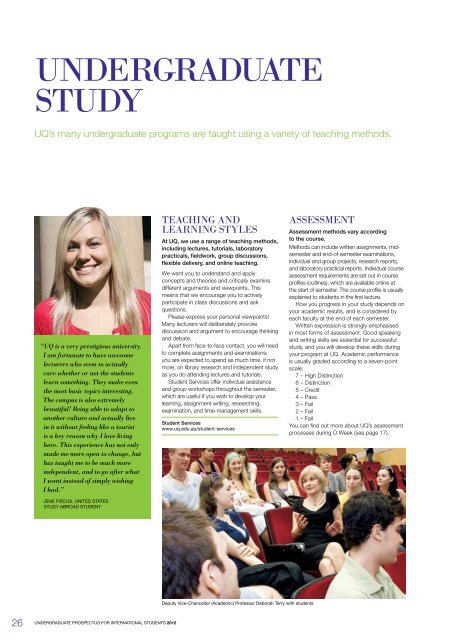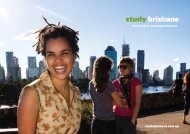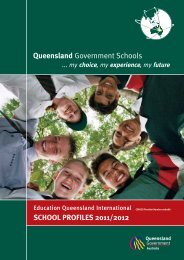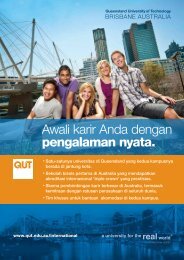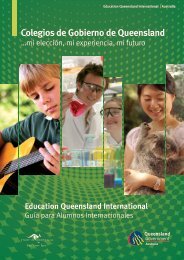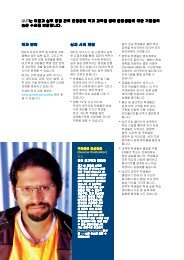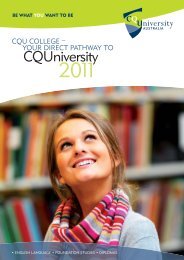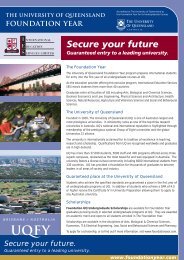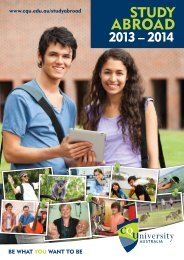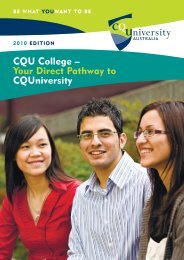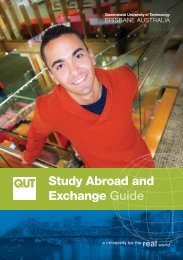UNDERgRADUATE PROSPECTUS - Study Brisbane
UNDERgRADUATE PROSPECTUS - Study Brisbane
UNDERgRADUATE PROSPECTUS - Study Brisbane
- No tags were found...
You also want an ePaper? Increase the reach of your titles
YUMPU automatically turns print PDFs into web optimized ePapers that Google loves.
Undergraduate<br />
study<br />
UQ’s many undergraduate programs are taught using a variety of teaching methods.<br />
“UQ is a very prestigious university.<br />
I am fortunate to have awesome<br />
lecturers who seem to actually<br />
care whether or not the students<br />
learn something. They make even<br />
the most basic topics interesting.<br />
The campus is also extremely<br />
beautiful! Being able to adapt to<br />
another culture and actually live<br />
in it without feeling like a tourist<br />
is a key reason why I love living<br />
here. This experience has not only<br />
made me more open to change, but<br />
has taught me to be much more<br />
independent, and to go after what<br />
I want instead of simply wishing<br />
I had.”<br />
jene fiscus, united states<br />
<strong>Study</strong> Abroad student<br />
Teaching and<br />
learning styles<br />
At UQ, we use a range of teaching methods,<br />
including lectures, tutorials, laboratory<br />
practicals, fieldwork, group discussions,<br />
flexible delivery, and online teaching.<br />
We want you to understand and apply<br />
concepts and theories and critically examine<br />
different arguments and viewpoints. This<br />
means that we encourage you to actively<br />
participate in class discussions and ask<br />
questions.<br />
Please express your personal viewpoints!<br />
Many lecturers will deliberately provoke<br />
discussion and argument to encourage thinking<br />
and debate.<br />
Apart from face-to-face contact, you will need<br />
to complete assignments and examinations:<br />
you are expected to spend as much time, if not<br />
more, on library research and independent study<br />
as you do attending lectures and tutorials.<br />
Student Services offer individual assistance<br />
and group workshops throughout the semester,<br />
which are useful if you wish to develop your<br />
learning, assignment writing, researching,<br />
examination, and time-management skills.<br />
Student Services<br />
www.uq.edu.au/student-services<br />
Assessment<br />
Assessment methods vary according<br />
to the course.<br />
Methods can include written assignments, midsemester<br />
and end-of-semester examinations,<br />
individual and group projects, research reports,<br />
and laboratory practical reports. Individual course<br />
assessment requirements are set out in course<br />
profiles (outlines), which are available online at<br />
the start of semester. The course profile is usually<br />
explained to students in the first lecture.<br />
How you progress in your study depends on<br />
your academic results, and is considered by<br />
each faculty at the end of each semester.<br />
Written expression is strongly emphasised<br />
in most forms of assessment. Good speaking<br />
and writing skills are essential for successful<br />
study, and you will develop these skills during<br />
your program at UQ. Academic performance<br />
is usually graded according to a seven-point<br />
scale:<br />
7 – High Distinction<br />
6 – Distinction<br />
5 – Credit<br />
4 – Pass<br />
3 – Fail<br />
2 – Fail<br />
1 – Fail<br />
You can find out more about UQ’s assessment<br />
processes during O Week (see page 17).<br />
Deputy Vice-Chancellor (Academic) Professor Deborah Terry with students<br />
26<br />
UNDERGRADUATE <strong>PROSPECTUS</strong> FOR INTERNATIONAL STUDENTS 2012


